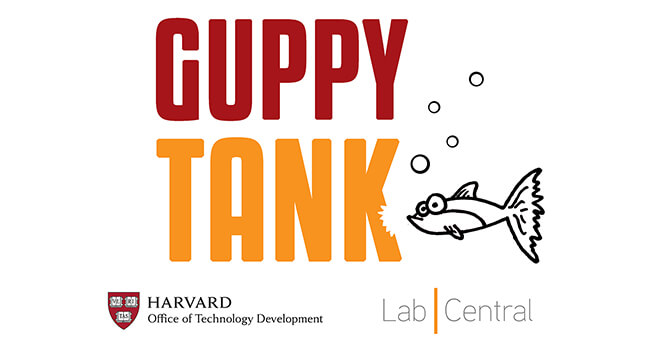Events All Events
Past Event
Guppy Tank 11/13/17
November 13th, 2017 ~ 11:00am - 01:00pm

No sharks in these waters! Harvard's Office of Technology Development and LabCentral invite you to the latest event in the Guppy Tank series, where two teams of Harvard life-science innovators will pitch their super-early-stage concepts to a panel of entrepreneurs and investors for constructive, in-depth feedback.
Please join us on November 13 from 4 to 6 p.m. to learn from experts on startup formation and participate in giving audience feedback. The event is accompanied by a networking reception.
Innovation Team 1:
Kai Chan, Tina Liu and George Church
Department of Genetics, Harvard Medical School
Wyss Institute for Biologically Inspired Engineering at Harvard University
Host immune responses pose a major challenge for the gene therapy field, as they often hamper not only safety but also the level and durability of gene expression. Professor George Church and a postdoc in his lab, Kai Chan, developed a technology that reduces AAV-induced acute inflammation and increases downstream gene expression (mouse liver and muscle data show >10x increase in mRNA expression of the transgene). The technology is a short oligonucleotide inserted in the AAV genome rather than a new capsid, making it much more versatile than conventional approaches. Together with Wyss Entrepreneur-in-Residence Tina Liu, they are building a startup to develop this technology so it may ultimately help patients.
Innovation Team 2:
SIM-PAL: Simply capturing interaction throughout the proteome
Christina Woo
CCB, Harvard
Many drugs interact with multiple protein targets (polypharmacology) that may increase therapeutic efficacy when properly exploited or cause unanticipated off-target effects when not fully understood. Polypharmacology occurs in diverse therapeutic areas and includes even common drugs such as NSAIDs, for which little is understood about their molecular targets. The Woo lab is developing a platform termed "Small Molecule Interactome Mapping by Photo-Affinity Labeling" (SIM-PAL) and applying it to the in cellulo characterization of drug binding sites. The platform uses (1) photochemical conjugation, (2) enrichment of the binding sites, and (3) targeted mass spectrometry-based assignment. SIM-PAL can be used to characterize drug interactions in the proteome in a multiplex format.
Tags: Guppy Tank
Press Contact: Kirsten Mabry | (617) 495-4157
All Events